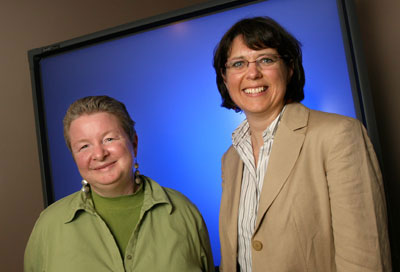At the confluence of ideas

Teressa Strong-Wilson (left) and Valerie Mary Nesset are REF mainstays.
Owen Egan
There are many firsts in our lives that are forever etched in memory—first kiss, first job, first love and the heartbreak that comes with it; first car, birth of a first child—and the endless string of firsts that they, in turn, unleash. For Jessica Toste, an MA student in Educational and Counselling Psychology, there was also the first presentation of her research to her peers and faculty. "It went well," she said the day after. "I was more nervous than I thought I'd be, but I was happy with the result."
Toste had just participated in the Faculty of Education's Research Exchange Forum (REF), an informal faculty-wide forum that gives graduate students and faculty members alike the opportunity to share their work. Held once or twice a week during the semester, the popular, hour-long events attract speakers from all departments in Education and promotes a lively cross-pollination of ideas.
While REF is running like a well-oiled machine these days, there were some initial misgivings early on. Teresa Strong-Wilson, a professor in the Department of Integrated Studies in Education, helped start REF back in 2005. While enlisting speakers didn't prove to be a problem, Strong-Wilson spent many of those early days with crossed fingers nonetheless. "The first semester was kind of touch-and-go," she says. "We had no idea if anyone would come." Her doubts proved unfounded and this semester, the 27 REFs drew enthusiastic audiences of students and professors, some even from outside the Education faculty.
Although it was designed as a vehicle to exchange research and ideas, REF has had the added benefit of chipping away at the silos so often found in academia. "We have all these doctoral programs where people often work in isolation," says Bob Bracewell, associate dean, Research and Graduate Students. "We wanted to encourage cross-talk and interchange and I've think REFs have done just that."
Toste can attest to the door-opening power of REFs. "Sometimes we don't even talk to people from within our on department," she says. "After my presentation, I ended up speaking with someone I know but whose research I knew nothing about. As it turns out, she is looking at a similar concept in her work but in a very different setting."
The benefits of REFs have proven to be substantial for many presenters. For some, like Valerie Mary Nesset, a PhD Candidate at the Graduate School of Library and Information Studies, the give-and-take during the question period at her first REF had a direct impact on her research. "It's important to remember that we present work that is in progress, so that things are still evolving," she said. "The feedback I got following my REF actually changed the tack of my research. It was extremely beneficial."
Other presenters enjoy the Q&A session precisely because it gives them first exposure to life in the big leagues of graduate studies—albeit, without the enormous pressure. "These are the kinds of questions you're going to face at your defense or when you submit your work to journals an conferences," says Toste. "It gives you an idea what you need to address in your work."
But the benefits aren't reserved for the presenters alone. Bracewell also sees REFs as important step in evaluating burgeoning professorial talent. "With doctoral students in particular, the implicit question is 'Do I see this person as my colleague in the future?' And that's basically what you measure everything against," he said. "REF gives us a glimpse of that potential."

